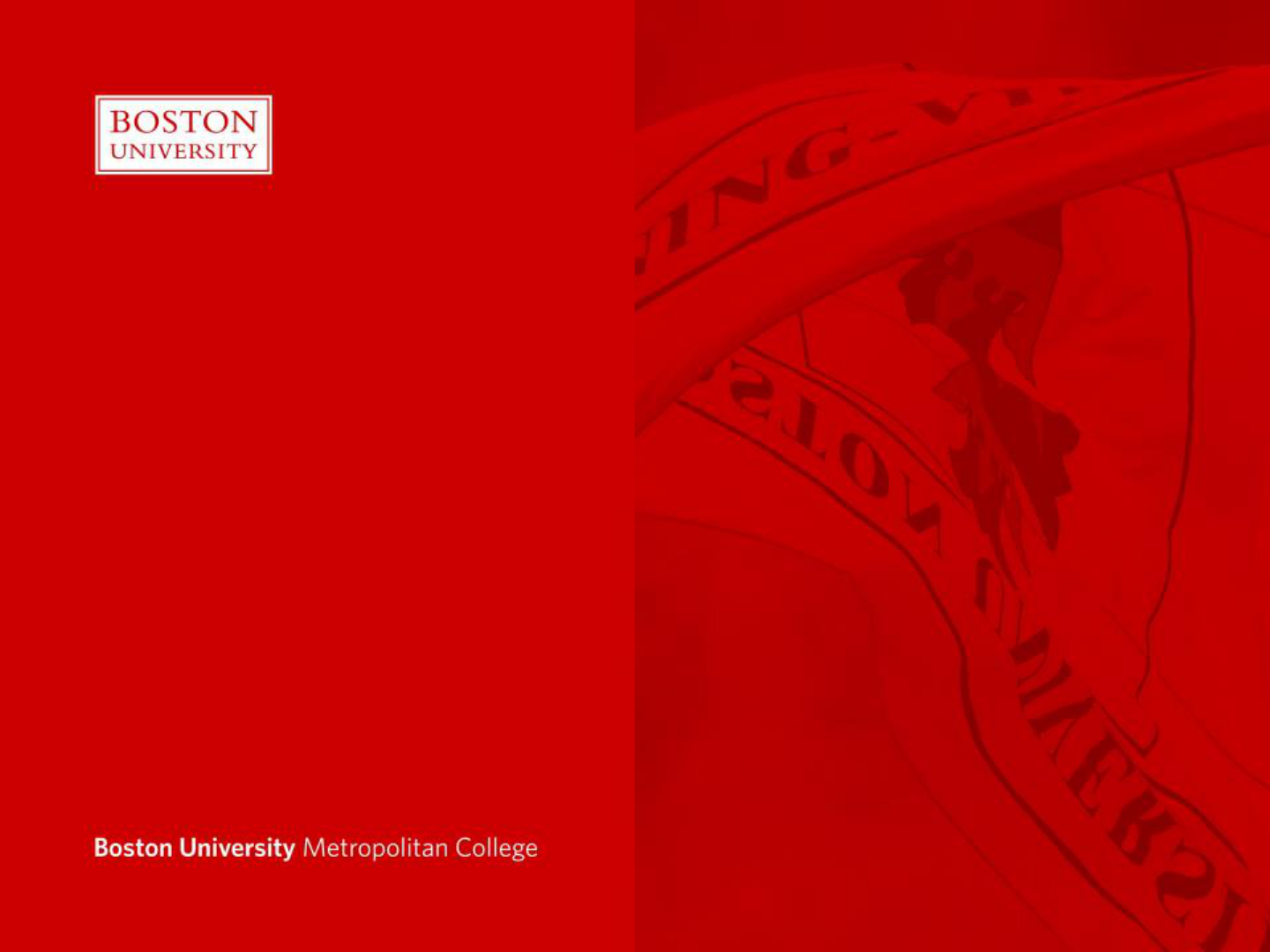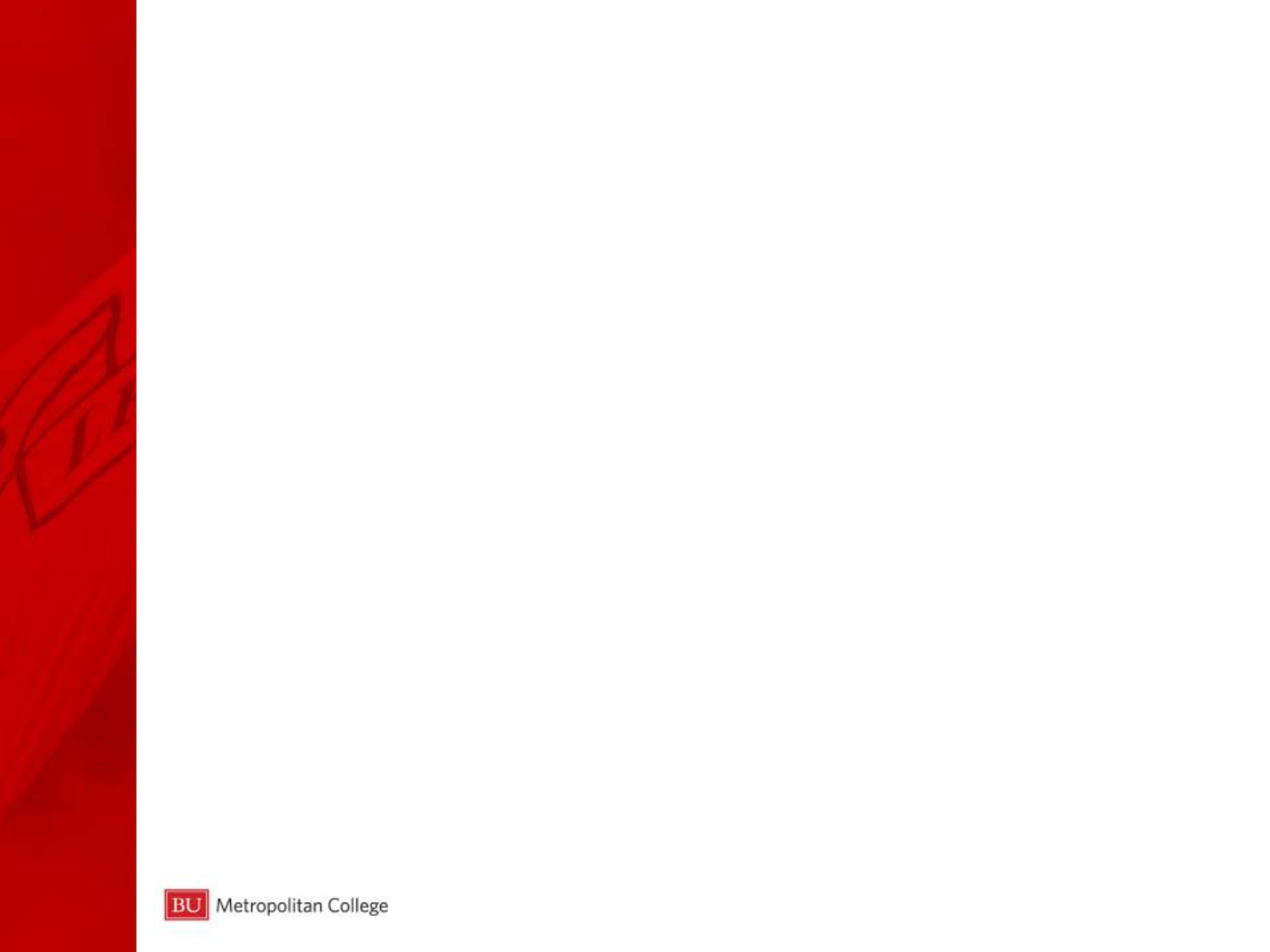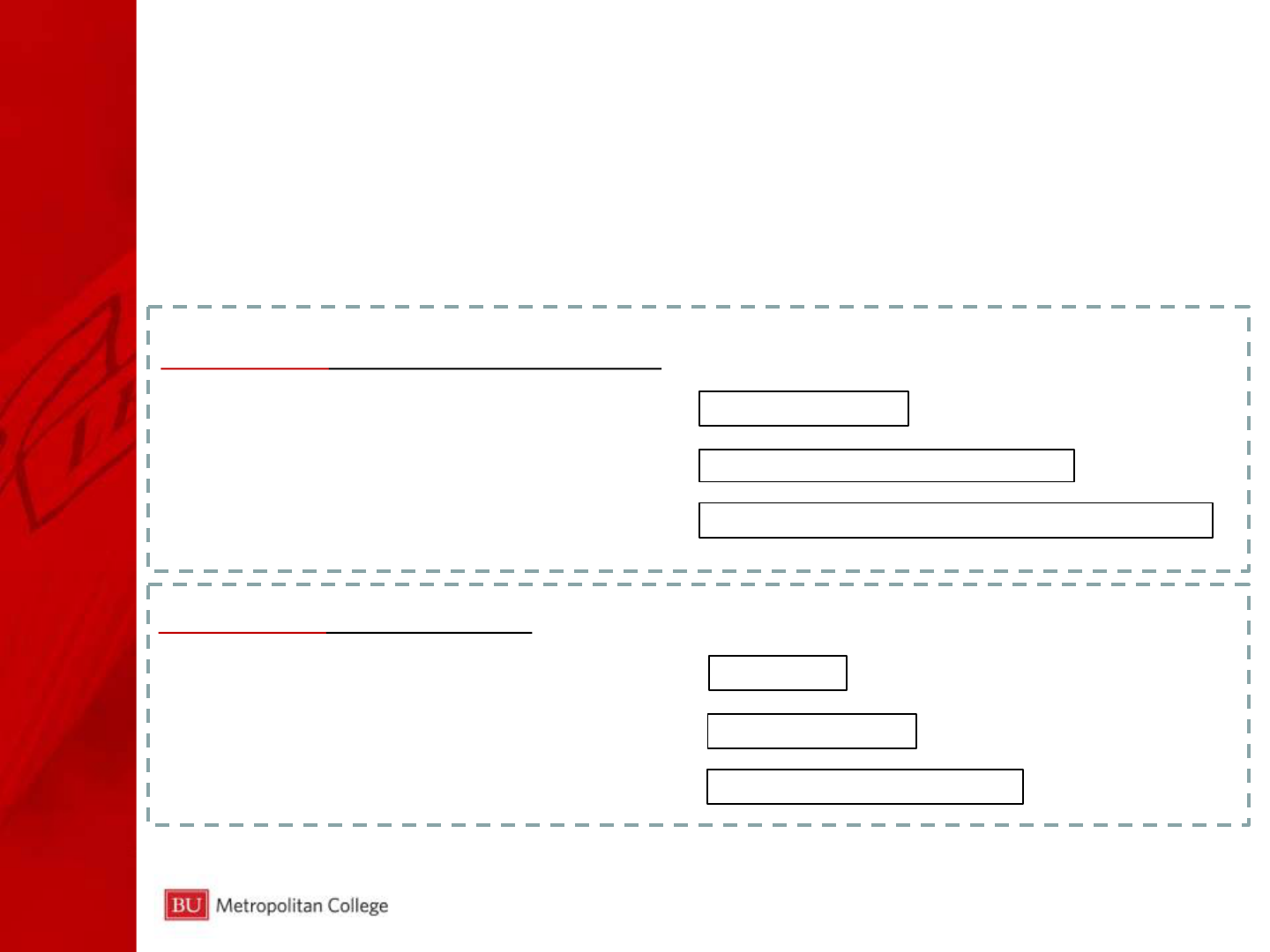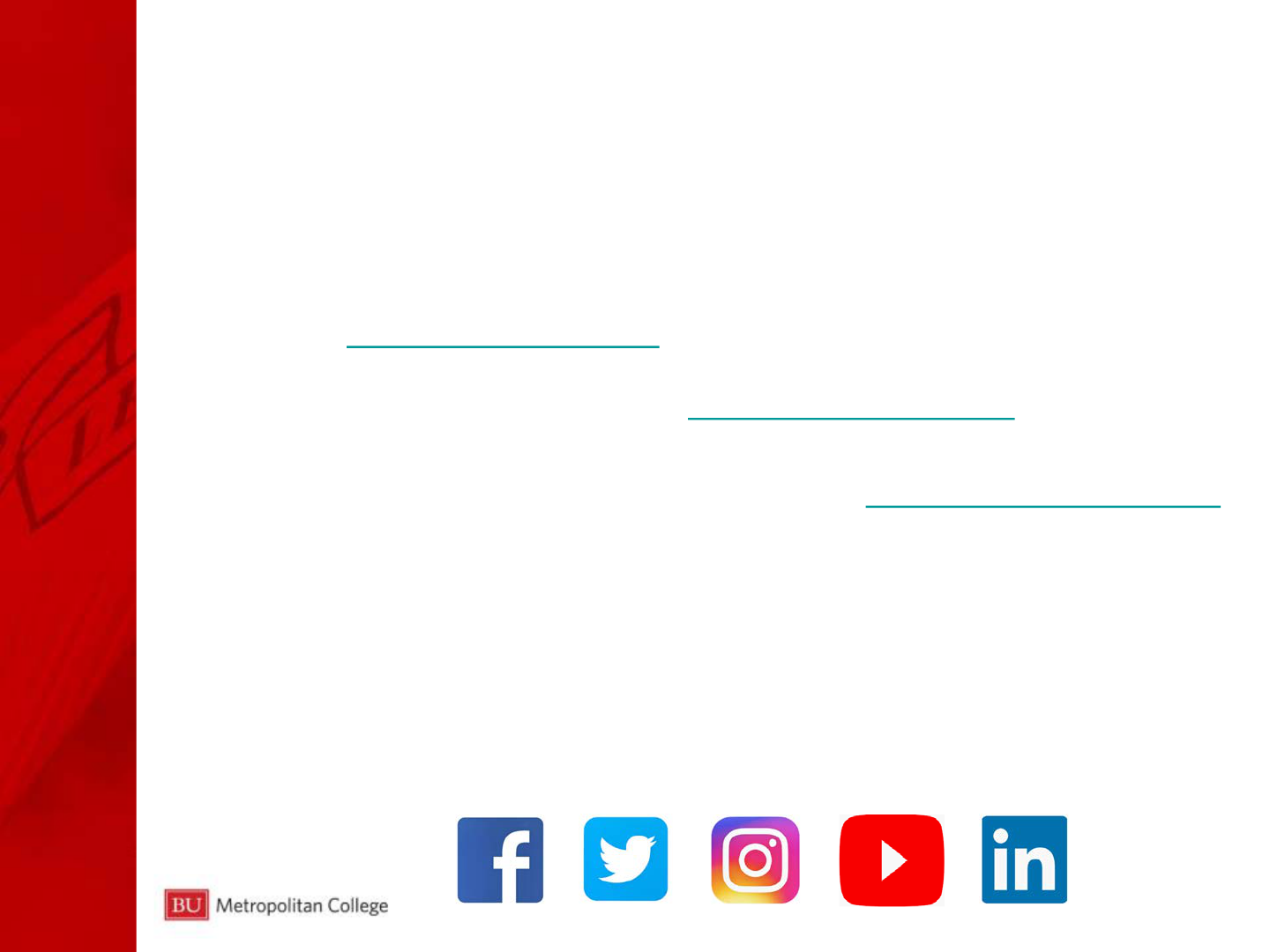
Metropolitan College (BU MET)
Your Future in Financial Management
We will begin momentarily…

Metropolitan College (BU MET)
Your Future in Financial Management

3
Dr. Alexander Becker
Assistant Professor of Administrative Sciences
PhD, Boston University
Diplom-Physiker, University of
Duisburg-Essen, Germany
Consults for numerous private firms and
government agencies, and architect and
develop many successful information systems
Expertise in systemic risk analysis, complex
systems and networks, quantitative
methods.
Prof. Becker’s research interests are in firm
capital structure and complex networks in
finance.
His most recent working paper is titled
“Corporate Leverage Ratio Adjustment
under cash-flow based covenants.”
Recipient of the 2014 CAS Outstanding
Teaching Fellow award at Boston University.

4
Agenda
• Introductions
• MS in Financial Management and Graduate Certificate
Options
• Course Snapshots
• Format Options (On-campus/Online)
• Admissions Process & Timeline
• Tuition & Financial Assistance
• Join the Conversation!

5
Boston University
13
Pulitzer Prize Winners
7 Nobel Prize Recipients
TOP 50
Universities
Worldwide
Regionally accredited by New England
Commission of Higher Education
(NECHE), formerly NEASC
33,000+
STUDENTS
4,000+
FACULTY
377,000+
ALUMNI
Most Innovative
Universities
#27
To be updated

6
Metropolitan College (BU MET)
• Largest & most diverse enrollment of graduate students of
17 schools & colleges @ BU
• A mission to broaden the reach of BU to help busy adults
achieve their personal and professional ambitions
• Research-based faculty and industry professionals
teaching both on campus & online courses
• 20 years of dedicated Online Education
• Liberating flexibility, an engaging learning community,
valuable career networks, and rigorous, practical coursework

7
Students acquire knowledge applicable to all aspects of
finance, including corporate finance, international finance
and trade as well as investments and derivatives.
Awareness of significant changes in the global financial
regulatory environment, especially after the subprime credit
crisis of 2008, and how these changes impact the overall
financial system.
Graduate Certificates also offered in:
Corporate Finance (4 courses)
Investment Analysis (6 courses)
International Finance (6 courses)
Financial Management (6 courses)
Financial Management

8
Choose one of 3 concentration options:
Investment Analysis
International Finance
No Concentration
10 courses (40 Credits) to complete degree:
4 Core Courses
Financial & Managerial Accounting
Financial Regulations & Ethics
Quantitative Methods for Finance
Corporate Finance
4 Concentration courses (No Concentration, Intl Finance,
Investment Analysis)
2 Elective courses
Students can choose from other programs or write a
Master’s thesis
Financial Management Curriculum

9
BU Finance Management Program Affiliation
with the CFA Institute
• Metropolitan College is a participant in the CFA Institute
University Affiliation Program.
• Our MSFM curriculum embeds a significant portion (70%) of
its course instruction coincident with the CFA® Curriculum:
1. Candidate Body of Knowledge™ (CBOK),
2. Code of Ethics and Standards of Professional Conduct
• Offers excellent preparation for the internationally recognized
CFA® Program exams.
• In addition, scholarships for the CFA Program exam are
available to enrolled students.

10
About the CFA Institute
1. Founded 1947
2. Global, not-for-profit professional organization of
Investment professionals
3. Mission:
a) Provides finance education
b) Promotes standards in ethics, education, and professional
excellence in the global investment industry
c) Provides professional certification: the CFA Charterholder
4. Global Recognition: some stats
a) 178,000 active charterholders practice in 162 markets,
b) 25,000 firms employ CFA charterholders,
c) 687 Affiliated Universities,
d) 150 CFA Societies,
e) 24 top asset management firms complies with Global Investment
Performance Standards GIPS®,
f) 70 years of shaping the industry and best practices

11
CFA-related financial services:
• Central Banking
• Commercial Banking
• Endowment Fund Management
• Financial Analyst
• Financial Advisors
• Financial News/Portals
• Financial Planner
• Government Ministries (Finance, Industry, Labor, Pension, Trade)
• Hedge Funds
• Institutional Fund Management
• Insurance
• Investment Banking
• Investment Management (Mutual Funds, Exchange-Traded Funds)
• Private Equity
• Sovereign Fund Management
Alumni Career Paths
Master of Science in Financial Management

12
• Through our affiliation with the CFA Institute,
students in the finance program are eligible for
scholarships!
• The scholarship waives the enrollment fee and partially
waves the exam fee, resulting in significant savings.
• Apply for a scholarship before registering for the
CFA Program exam.
• Submit your résumé
• Submit your most recent official transcript.
• Submit as an essay explaining, in no more than 500
words, why you are the best .
• The scholarships are administered by the Administrative
Sciences department at MET.
CFA Scholarships

13
• Finance is a highly competitive and dynamic industry that
demands quantitatively oriented professionals.
• AD 685 (Quantitative Methods) provides students with the
empirical techniques used in the analysis of financial markets
• Strong focus on financial applications using actual data
• Example 1: classical linear regression models and tests of asset
pricing models widely used in the industry
• Example 2: time series analysis and the forecasting of economic
variables
• Software: homework and in-class assignments require you to
become familiar with R, a widely used free software for
statistical analysis.
• Free Self-Paced Lab AD R100
Course Snapshot:
AD 685 – Quantitative Methods for Finance

14
• The industry’s demand for candidates with programming skills
is continuously growing
• In addition to a solid foundation in R, our applicants can stand out
with a background in Python after they take AD 587
• AD 587 combines programming skills with a comprehensive
overview of relevant finance concepts.
• Probability distributions and financial time series
• Modern portfolio theory
• Fundamental and macroeconomic factor models
• Statistical factor models and fixed income
• Option valuation
• Financial fragility and complex networks in finance
• Free Self-Paced Lab AD PY100
Course Snapshot:
AD 587 – Interdisciplinary Methods for Quantitative Finance

15
• Cryptocurrencies and distributed ledger technology
have exploded into public consciousness
• Blockchain technology has the potential to disrupt business and
financial services
• Akin to internet vs brick-and-mortar retail
• Course uses tools from economics, investments
and corporate finance to discuss digital currencies
and blockchain
• Recent student projects include
• The impact of Blockchain Technology on Banking
• The Environmental Effects of Blockchain Technology
• How Blockchain Technology will Revolutionize Supply Chain
Management
Course Snapshot:
AD 528 – Blockchain Finance

16
Course Snapshot:
AD 717 – Investment Analysis & Portfolio Management
Good investment decisions
• include a proper valuation of securities ()
• consider the tradeoff between risk and return ()
• Finding the optimally diversified
portfolio
• Understanding the Capital Asset
Pricing Model (CAPM)
• Using factor-models
• Valuation models for stocks, bonds,
& other financial assets
• Evaluation of financial performance
• Analysis of financial statements

17
• Flexible to fit your schedule
Program Structure
• On Campus & Online options, with ability to interchange
• Part-Time or Full-Time study, with ability to alternate
• Evening On campus coursework and Live classrooms
• Year round courses (Fall, Spring, & Summer semesters)

18
• Part-time students take 1-2 courses / 14-week semester*
• Full-time students take 3-4 courses / 14-week semester*
• Most courses meet ONE evening each week (6-9 PM),
Monday-Thursday
• On-campus courses offered in four semesters:
Fall (September)
Spring (January)
Summer 1 (May)*
Summer 2 (July)*
* Summer sessions are 6-week
terms, meeting 2x/week
On-Campus Programs

19
• Recommended part-time taking 1 course / 7-week session*
(up to 2 courses/semester, up to 6/year)
• 6 sessions per year*:
Fall 1 (September)
Fall 2 (November)
Spring 1 (January)
Spring 2 (March)
Summer 1 (May)
Summer 2 (July)
• Courses are asynchronous
• Live Classroom each week
• 15:1 student/facilitator ratio
• Online lectures, videos, interactive animations & simulations, discussion
boards, electronic portfolios, web conferencing, etc.
Online Programs
*Gastronomy/Food Studies courses are
offered on a 14-week schedule Fall 1,
Spring 1, and Summer 1

20
12 – 16 Months
16 Months
Complete Your Program at Your Own Pace
10-12 Course Masters (40-48 credits)
FULL-TIME On Campus:
PART-TIME On Campus / Online:
4 Course Graduate Certificate (16 credits)*
8 Course Masters (32 Credits)
8 Months
4 Months
4 Course Graduate Certificate (16 credits)
8 Months
* Not all Graduate Certificates are available for full-time study
20-24 Months
8 Course Masters (32 Credits)
10-12 Course Masters (40-48 credits)
• Up to 6 years to complete your degree
• Master’s Degrees can be completed part-time in < 2 years

22
Transcripts
• Transcripts from all colleges and universities attended*
*Transcripts must be in English. Unofficial & in-progress transcripts are acceptable
for the admissions review process. Official transcripts are required upon enrollment
.
Professional Portfolio
• Current Resume
• Personal Statement
• Three Letters of Recommendation**
•
**It is required that one letter of recommendation be an academic reference if you
graduated or engaged in post-graduate education in the past three years.
Test Scores
• NO GRE/GMAT required (optional to submit)
• TOEFL, IELTS, or Duolingo requirement for international students***
***Students who have earned or will have completed at least 2 years of a bachelor’s or master’s
degree at an institution in which the language of instruction was English are eligible for an
automatic waiver

23
2021-2022 Tuition & Financial Assistance
Student Status
Cost
PART-TIME:
1-2 courses (<12 credits)
$940 per CREDIT (600+ level courses)
(4 credit course = $3,760)
$505 per CREDIT (500-level courses)
(4 credit course = $2,020)
FULL-TIME:
3-4 courses (12+ credits)
$29,280 per SEMESTER*
*Summer semester tuition rates may vary
• Merit Scholarships (Domestic Master’s Applicants)
• Graduate Loans
• Veteran Benefits: veterans@bu.edu
• Employer Reimbursement / Direct Billing: metc[email protected]
• Graduate Assistantships & MET Employment opportunities

24
MET Graduate Financial Assistance Staff:
Shabeeb Tauhid
Sr. Graduate Financial
Assistance Advisor
Shelley Tregor
Director, Graduate Financial
Assistance
617-358-4072
finana[email protected]du
bu.edu/met/financial-aid

25
• Students can register for
up to 2 courses prior to
formal admission
Non-Degree Course Enrollment
• Non-degree coursework
carries full academic credit
and can be transferred
into a certificate or degree
program
• Enrollment for pre-
requisite coursework
(Computer Science)
• No Federal Financial Aid
eligibility
bu.edu/met/admissions/course-registration

27



